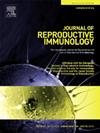MMP2 and MMP9 are associated with the pathogenesis of recurrent pregnancy loss through protein expression rather than genetic polymorphism
Abstract
Matrix metalloproteinases (MMPs) degrade extracellular matrix proteins and are important for placenta formation during early pregnancy. Recurrent pregnancy loss (RPL) is associated with abnormalities in endometrial extracellular matrix remodeling. This study aimed to elucidate the roles of MMP2 and MMP9 in RPL pathogenesis. In total, 295 women with a history of RPL and 101 controls were included in this genetic study. Genotype analysis was performed using polymerase chain reaction (PCR) restriction fragment length polymorphisms. For proteolytic analysis, decidua and villi were collected from 10 RPL-miscarried women with normal fetal chromosomes (NC) and 19 women with fetal chromosome aberrations (AC). The expression of MMP2 and MMP9 in the decidua and villi was measured by IHC and ELISA. All samples were collected after obtaining informed consent. There were no statistically significant differences in MMP2–735 C/T and MMP9–1562 C/T frequencies between women with RPL and the controls. There was no significant difference in MMP2 expression levels in the villi; however, MMP9 expression was significantly higher in normal fetal chromosomes. In the decidua, the expression of MMP2 in the NC group was significantly lower, and MMP9 in the NC group was significantly higher than in the AC group. Although no differences in MMP2–735 C/T and MMP9–1562 C/T gene polymorphisms were observed in the present study, it is suggested that differences at the protein level are involved in the pathogenesis of RPL since MMP expression is not only regulated by genes but also by local inflammation and various inductive signals.

 求助内容:
求助内容: 应助结果提醒方式:
应助结果提醒方式:


